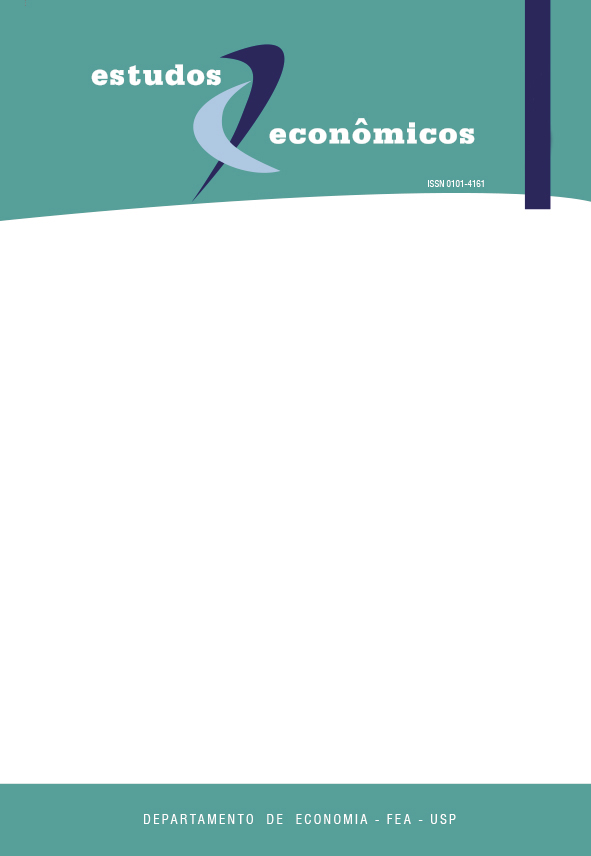O custo de bem-estar da inflação: cálculo tentativo com o uso de um modelo de equilíbrio geral
DOI:
https://doi.org/10.1590/S0101-41612008000100006Palavras-chave:
custo de bem-estar da inflação, senhoriagem, modelo de equilíbrio geralResumo
O custo de bem-estar da inflação tem sido calculado usando-se basicamente dois tipos de abordagem: o do Equilíbrio Parcial e do Equilíbrio Geral. Apesar da abordagem do Equilíbrio Geral ser considerada analiticamente superior e que em alguns casos produz valores maiores do que com o uso da análise de Equilíbrio Parcial - por exemplo, Dotsey e Ireland (1996) para os Estados Unidos e Yoshino (2002) para o Brasil - há também vários exemplos nos quais são comparáveis os resultados com os dois procedimentos metodológicos - ver, por exemplo, Rossi (2003) com Equilíbrio Parcial contra Polato e Fava e Rocha (2003), com Equilíbrio Geral, ambos os estudos com aplicação ao caso brasileiro. A abordagem de Equilíbrio Geral deste estudo segue o procedimento metodológico de Abel (1997) e contempla certos aspectos não levados em conta em aplicações anteriores para o Brasil. Mais precisamente, o papel que a inflação tem no bem-estar do indivíduo em vista de a tributação incidir sobre os valores nominais, ao invés de valores reais, dos seus rendimentos.Downloads
Referências
Abel, Andrew B. Comment on “The costs and benefits of going from low inflation
to price stability” by Martin Feldstein. In: Romer, Christina D.; Romer, David
H.(eds.) Reducing inflation: motivation and strategy. University of Chicago Press, p. 156-165, 1997.
Auerbach, Alan. Appendix: the effect of inflation on the tax value of depreciation.
In: Feldstein, Martin; Green, Jerry; Sheshinki, Eytan. Inflation and taxes in a
growing economy with debt and equity finance. Journal of Political Economy, part 2 , S68-69, April 1978.
Bakhshi, H.; Haldane, A.G.; Hatch, N. Some costs and benefits of price stability
in the United Kingdom. Bank of England, Working Paper Series No. 78, p. 73,
March 1998.
Bullard, James B.; Russel, Steven. How costly is sustained low inflation for the
U.S. economy?. Federal Reserve Bank of St. Louis Review, v. 86, n. 3, p.35-67,
May/June 2004.
Cysne, Rubens Penha. Divisia index, inflation and welfare. Journal of Money, Credit, and Banking, v. 35, issue 2, p. 221-239, April 2003.
Dotsey, Michael; Ireland, Peter. The welfare cost of inflation in general equilibrium.
Journal of Monetary Economics, v. 37, p. 29-47, 1996.
Feldstein, Martin. The costs and benefits of going from low inflation to price stability.
In: Romer, Christina D.; Romer, David H.(eds.) Reducing inflation: motivation
and strategy. University of Chicago Press, p. 123-156, 1997.
Lucas, Robert E. Inflation and welfare. Econometrica, v. 68, n. 2, p. 247-274, March 2000.
Pastore, Affonso Celso. Senhoriagem e inflação: o caso brasileiro. Economia Aplicada, v. 1, n. 4, p.583-621, out./dez. 1997.
Polato e Fava, Ana Claudia; Rocha, Fabiana. Custos de bem-estar da inflação no Brasil: uma comparação das estimativas de equilíbrio parcial e geral. Economia Aplicada, v. 7, n. 3, p. 461-490, jul/set 2003.
Romer, David. Advanced macroeconomics. 2nd. Edition. Boston, MA: McGraw Hill, 2001.
Rossi, José W. Shoe-leather costs of inflation: some estimates for Brazil. Economia Aplicada, v. 7, n. 3, p. 439-459, jul/set 2003.
Rossi, José W. The demand for money in Brazil: what hapenned in the 1980s?. Journal of
Development Economics, v. 31, p. 357-367, 1989.
Rossi, José W. A demanda por moeda no Brasil: o que ocorreu a partir de 1980?. Pesquisa
e Planejamento Econômico, v. 18, n. 1, p. 37-54, abril 1988.
Sidrauski, Miguel. Rational choice and patterns of growth in a monetary economy. American Economic Review, 57, p. 534-544, 1967.
Yoshino, J.A. The brazilian welfare costs of inflation. Universidade de São Paulo, July 2002, 26 p. Mimeografado.
Downloads
Publicado
Edição
Seção
Licença
Copyright (c) 2008 José W. Rossi

Este trabalho está licenciado sob uma licença Creative Commons Attribution-NonCommercial 4.0 International License.
A submissão de artigo autoriza sua publicação e implica o compromisso de que o mesmo material não esteja sendo submetido a outro periódico.
A revista não paga direitos autorais aos autores dos artigos publicados.





 Atualizado em 14/08/2025
Atualizado em 14/08/2025